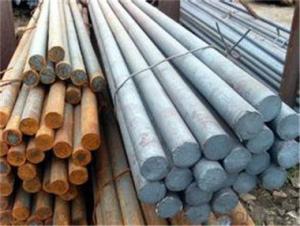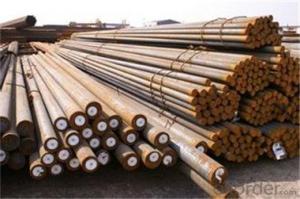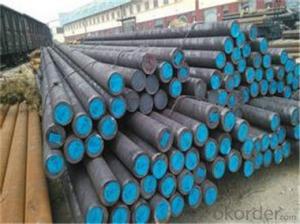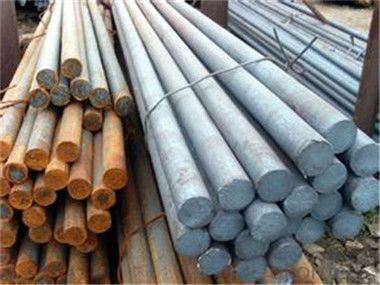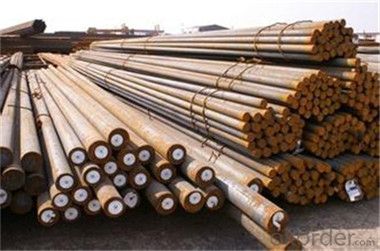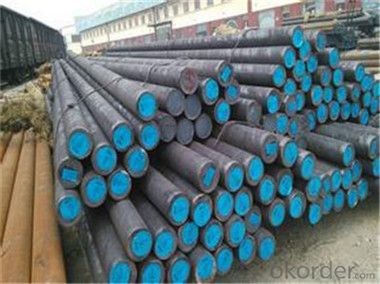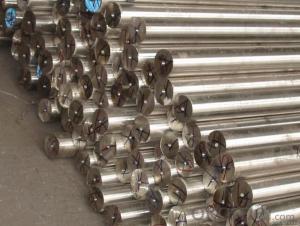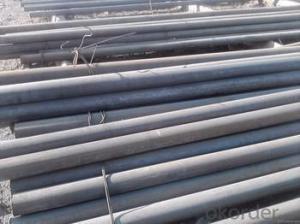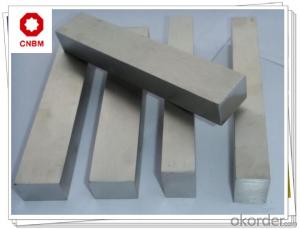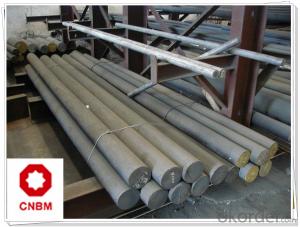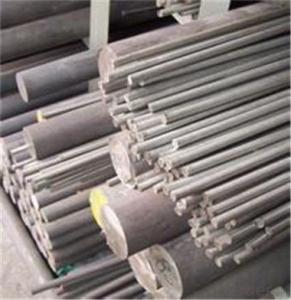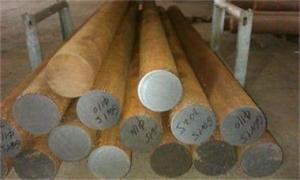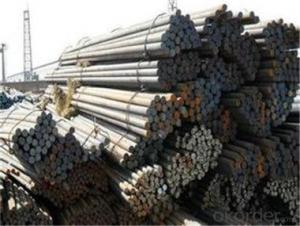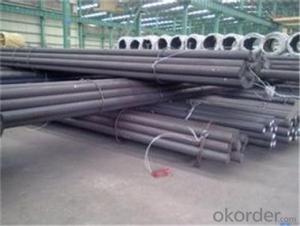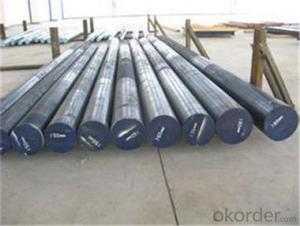Hard Chrome Carbon Steel Round Bar from China
- Loading Port:
- Tianjin
- Payment Terms:
- TT OR LC
- Min Order Qty:
- 456 m.t.
- Supply Capability:
- 2000000 m.t./month
OKorder Service Pledge
OKorder Financial Service
You Might Also Like
Description of steel round bar:
1.Diameter 80 to 800 mm
2.Black or Bright surface
3.Annealed or Quenched and tempered provided
4.Cutting service provide
Festures of steel round bar:
Dia 80-800mm Length:2000-13000mm or as required
Specifications of steel round bar:
Description |
Carbon Steel Rod/Carbon Steel Bar,carbon steel rod,carbon steel shaft,mild steel bar, mild steel shaft,ms bar | |
Material | ASTM | 1005,1006,1008,1010,1015,1020,1025,1030,1035,1040,1045,1050,1055,1060,1065,1070,1080,1084, 1016,1022 |
DIN | Ck10,Ck15,Ck22,Ck25,Ck30,Ck35,Ck40,Ck45,Ck50, 30Mn4,40Mn4 | |
BS | 040A04,095M15,045M10,080A40,045M10,080M50 | |
Standard | GB/T799,ASTM A29,A108,A321,A575,BS970,DIN1652,JIS G4051 | |
Section shape |
Round | |
Length |
As your required | |
Application | Carbon steel rod applies to chemical industry, shipping industry, manufacturing industry,construction,decorate Industry,electric power, pump shafts, sanitary wares,furniture handles,boiler,high temperature resistant,low temperature resistant, corrosion resistant. | |
Images of steel round bar:
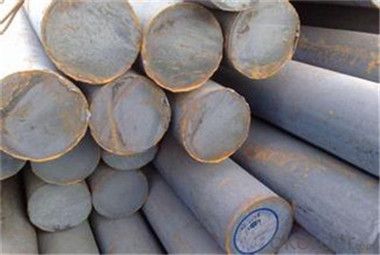
FAQ:
1. What is your package?
Packing situation: standard seaworthy packing or as customer required.
2. How long is the lead time?
Delivery time: 45 days after order confirmed.
3. What payment term do you accept?
Payment: T/T or L/C at sight.
- Q: What kind of steel is used for anchor bolt material? What's the quality of anchor bolt material?
- When the mechanical component is installed on the concrete foundation, one end of the bolt is J and L shaped, and is embedded into the concrete.
- Q: What is the maximum length available for steel round bars?
- The maximum length available for steel round bars can vary depending on the supplier and the specific requirements, but typically it can range from 12 to 24 feet.
- Q: Are steel round bars suitable for tool-making applications?
- Yes, steel round bars are suitable for tool-making applications. Steel round bars offer several advantages that make them ideal for tool-making. Firstly, steel has excellent strength and durability, allowing tools made from steel round bars to withstand heavy use and resist wear and tear. Steel also has a high hardness, which is crucial for tools that need to cut, drill, or shape materials. Additionally, steel round bars can be easily machined and shaped into various tool designs, providing versatility and customization options. Furthermore, steel has good heat resistance and can withstand high temperatures, making it suitable for tools used in demanding applications such as metalworking or construction. Overall, steel round bars are a popular choice in tool-making due to their strength, durability, versatility, and ability to meet the specific requirements of different tool applications.
- Q: Can steel round bars be threaded?
- Yes, steel round bars can be threaded. Threading is a common process used to create a helical ridge on the surface of a round bar, allowing it to be securely fastened to other components or fittings.
- Q: Are steel round bars prone to fatigue failure?
- Yes, steel round bars are prone to fatigue failure. Fatigue failure is the result of repeated cyclic loading or stress on a material, causing it to weaken and eventually fail, even when the applied stress is below its ultimate strength. Steel round bars, like any other structural material, are susceptible to fatigue failure due to their inherent characteristics. Fatigue failure in steel round bars can occur due to various factors, including improper design, inadequate material selection, manufacturing defects, or excessive cyclic loading. Factors such as surface defects, notches, stress concentrations, and corrosive environments can further accelerate the fatigue process. To mitigate the risk of fatigue failure, engineers and designers employ various strategies such as implementing appropriate design practices, selecting high-quality materials, conducting thorough inspections, applying stress-relieving treatments, and considering the impact of cyclic loading during the structural design phase. It is important to note that while steel round bars are prone to fatigue failure, the actual susceptibility depends on numerous factors, including the specific steel grade, loading conditions, environmental factors, and overall structural design. Therefore, it is crucial to carefully assess these factors and employ appropriate mitigation measures to ensure the safe and reliable performance of steel round bars in various applications.
- Q: What are the considerations for selecting the right steel grade for a round bar?
- When selecting the right steel grade for a round bar, there are several considerations to be taken into account. Firstly, it is important to consider the intended application of the round bar. Different steel grades have varying properties that make them suitable for specific purposes. For example, if the round bar will be used in a high-temperature environment, a steel grade with excellent heat resistance such as stainless steel or high-alloy steel would be ideal. On the other hand, if the round bar will be used in structural applications, a steel grade with good strength and ductility, such as carbon steel, may be more appropriate. Another consideration is the desired mechanical properties of the round bar. This includes factors such as the required tensile strength, yield strength, hardness, and toughness. These properties can vary significantly between different steel grades, so it is important to choose a grade that meets the specific requirements of the application. The corrosion resistance of the steel grade is also an important consideration. If the round bar will be exposed to corrosive environments, such as in marine or chemical applications, a stainless steel grade with high resistance to corrosion would be recommended. Alternatively, if corrosion resistance is not a major concern, a carbon steel grade may be more cost-effective. Cost is another factor that should be taken into consideration when selecting a steel grade for a round bar. Different steel grades have varying costs based on factors such as availability, demand, and manufacturing processes. It is important to balance the desired properties of the round bar with the available budget to ensure cost-effectiveness. Furthermore, it is important to consider the manufacturability of the steel grade. Some steel grades may be more difficult to machine or weld, which can impact the production process and cost. It is important to choose a steel grade that is readily available and can be easily processed to meet the required specifications. Lastly, it is always advisable to consult with steel suppliers, engineers, or metallurgists to ensure that the chosen steel grade aligns with the specific requirements of the application. They can provide valuable insights and recommendations based on their expertise and experience in the industry.
- Q: Can steel round bars be used for shafts or axles?
- Indeed, shafts or axles can make use of steel round bars. In a multitude of industries, including automotive, machinery, and construction, steel round bars are frequently employed due to their robustness, longevity, and adaptability. Their selection for shafts or axles often stems from their capacity to endure substantial loads, furnish dependable support, and endure wear and tear. By virtue of being machinable and amenable to heat treatment, steel round bars can be customized to meet specific prerequisites, rendering them well-suited for deployment as shafts or axles in a wide range of applications where strength and dependability are paramount, such as vehicles, industrial apparatus, and rotating machinery.
- Q: What is the minimum tensile strength of steel round bars?
- The minimum tensile strength of steel round bars can vary depending on the specific grade or type of steel being used. However, common steel grades typically have a minimum tensile strength of around 400 MPa (megapascals) or 58,000 PSI (pounds per square inch).
- Q: Are steel round bars available in different colors?
- Steel round bars are generally found in a metallic grey hue, which is the inherent color of the steel material. Nevertheless, alternative colors of steel round bars can be obtained by utilizing different techniques like powder coating or painting. Through these procedures, a layer of paint or powder is applied to the surface of the steel, offering a diverse array of colors. This facilitates customization and aesthetic considerations, particularly in applications where the visual aspect of the steel is significant. It should be noted that the range of available colors may differ depending on the supplier or manufacturer.
- Q: Can steel round bars be used for making architectural or decorative elements?
- Certainly, steel round bars are an excellent choice for crafting architectural or decorative elements. These bars possess numerous advantages that render them perfect for such applications. To begin with, steel is an enduring and robust material, guaranteeing the longevity and stability of the architectural or decorative element. Moreover, steel round bars can be easily manipulated and personalized to fashion intricate designs, making them adaptable for various architectural styles and aesthetics. These bars can be employed to produce features such as railings, balustrades, ornamental gates, sculptures, or even pieces of furniture. Additionally, the sleek and polished surface of the steel round bars enhances their visual allure, rendering them ideal for decorative purposes. Furthermore, steel is resistant to corrosion, ensuring that the architectural or decorative element will remain intact and visually pleasing even in outdoor or high-moisture environments. In conclusion, steel round bars are a fitting and sought-after option for creating architectural or decorative elements owing to their durability, versatility, and visual appeal.
Send your message to us
Hard Chrome Carbon Steel Round Bar from China
- Loading Port:
- Tianjin
- Payment Terms:
- TT OR LC
- Min Order Qty:
- 456 m.t.
- Supply Capability:
- 2000000 m.t./month
OKorder Service Pledge
OKorder Financial Service
Similar products
Hot products
Hot Searches
Related keywords
